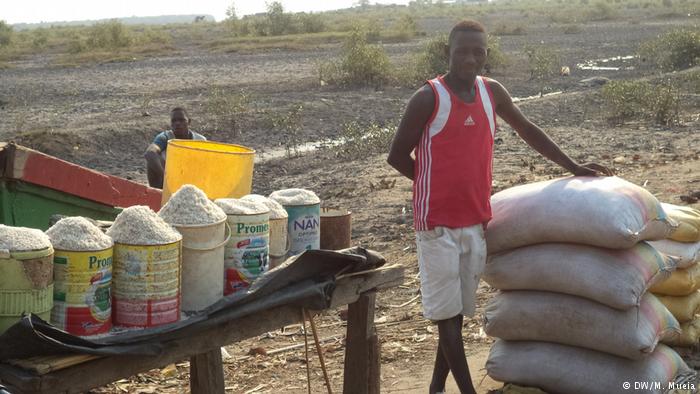Mozambique: New wave of attacks in Cabo Delgado displaces about 47,000 - NGO
China demand sparks critical salt shortage in Zambézia

Sale of salt in Icidhua neighbourhood (Quelimane). Photo: DW
Dozens of villagers in Maquival, Zambezia province in central Mozambique, have been without cooking salt for five months. The shortage has forced them to use firewood ash and the salty water of the mangroves at high tide.
Selling to the Chinese
Helena Joao one of Maquival’s residents, says her family is facing health problems because of the constant use of mangrove water, and that salt producers in the region are choosing to sell the product to the Chinese rather than domestically.
“We do not have any salt here. Our only option to give food the taste of salt is using the water from the mangrove. We boil this water and we use the small solid particles left in the pot as salt. The producers sell the salt to the Chinese, and what we want to know is, how come the Chinese come all that way just to buy salt?”
Memuna Menupa, another 50-year-old resident, is also worried about the situation.
“We have not been using salt for several days. Without salt, the food has no taste . We just eat it to survive. It’s the first time I’ve seen this. There used to be a lot of salt out there at street vendors, but at an unaffordable price. They sell it salt to the Chinese, because the Chinese have a lot of money,” she complains.
Prices increase
The salt shortage has hit the whole of the province. In Quelimane, the provincial capital, the price has risen dramatically, from 200 meticais (about 3 Euros) for 50 kilograms to as much as 1,600 meticais (about 24 Euros).

Salt seller Amelia Chico says the problem is the result of highdemand from the Chinese.
“They bring lorries, collect all the salt, and we are left with little salt. The price the Chinese pay is the same, between 1,500 and 1,600 meticais (about 24 Euros).”
The authorities in the province acknowledge the problem, but say the situation will be remedied within days.
Quelimane’s administrator, Carlos Carneiro, doesn’t doubt that Chinese intermediaries are buying up salt, adding that “it’s not only salt, but crab and shrimp as well. We are working with these Chinese to see if we can control the issue. We acknowledge that there are difficulties in the main salt fields here in Maquival, Idugo, too, where producers need financial support to increase their output”.












Leave a Reply
Be the First to Comment!
You must be logged in to post a comment.
You must be logged in to post a comment.